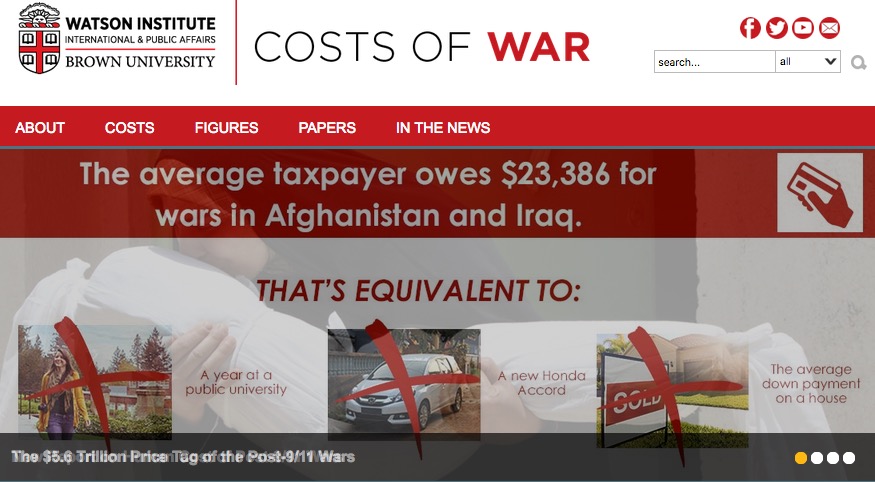11 Nov 2018
Brown Univ study tabulates casualties of the “War on Terror”, a wake-up call for the “Industry of Peace”
Bangkok — For the last few decades, and especially since the 9/11 attacks, the United States, the self-proclaimed “leader of the free world”, has been involved in several wars under the umbrella of the “War on Terror.” Today, as the killings continue unchecked, academic studies are striving to tabulate the grim costs in human life, raise public awareness and elevate demands for accountability.
The latest study by the Watson Institute for International and Public Affairs, Brown University, released just prior to today’s 100th anniversary of the end of World War I, says that between 480,000 and 507,000 people have been killed in the United States’ post-9/11 wars in Iraq, Afghanistan, and Pakistan. This tally of the counts and estimates of direct deaths caused by war violence does not include the more than 500,000 deaths from the war in Syria, raging since 2011, which the US joined in August 2014.
The statistics are a sombre reminder of the failure of the so-called “industry of peace” to walk the talk and incorporate peace-building into its Sustainability Agenda. Today, the merchants of death, war and conflict are far bigger drivers of jobs, income and economic growth than the “industry of peace”. Who is profiting from this death and destruction? Where are the check and balance mechanisms? Who should be held accountable?
All issues that are NEVER discussed by the so-called “thought-leaders” and “innovative thinkers” in travel & tourism forums.
As always, Travel Impact Newswire is at the forefront of the drive to demand answers from the intellectually challenged Travel & Tourism industry. Read, think, question and act!

Summary of Findings
Some of the Costs of War Project’s main findings include:
-
370,000 people have died due to direct war violence, including armed forces on all sides of the conflicts, contractors, civilians, journalists, and humanitarian workers.
-
It is likely that many times more than 370,000 people have died indirectly in these wars, due to malnutrition, damaged infrastructure, and environmental degradation.
-
200,000 civilians have been killed in direct violence by all parties to these conflicts.
-
Over 6,800 US soldiers have died in the wars.
-
We do not know the full extent of how many US service members returning from these wars became injured or ill while deployed.
-
Many deaths and injuries among US contractors have not been reported as required by law, but it is likely that at least 6,900 have been killed.
-
10.1 million million Afghan, Iraqi, and Pakistani people are living as war refugees and internally displaced persons, in grossly inadequate conditions.*
-
The US military is conducting counterterror activities in 76 countries, vastly expanding the counterror war across the globe.
-
The wars have been accompanied by erosions in civil liberties and human rights at home and abroad.
-
The human and economic costs of these wars will continue for decades with some costs, such as the financial costs of US veterans’ care, not peaking until mid-century.
-
US government funding of reconstruction efforts in Iraq and Afghanistan has totaled over $170 billion. Most of those funds have gone towards arming security forces in both countries. Much of the money allocated to humanitarian relief and rebuilding civil society has been lost to fraud, waste, and abuse.
-
The cost of the Iraq, Afghanistan, Pakistan, and Syria wars totals about $5.6 trillion. This does not include future interest costs on borrowing for the wars, which will add an estimated $8 trillion through 2054.
-
The ripple effects on the US economy have also been significant, including job loss and interest rate increases.
-
Both Iraq and Afghanistan continue to rank extremely low in global studies of political freedom.
-
Women in Iraq and Afghanistan are excluded from political power and experience high rates of unemployment and war widowhood.
-
Compelling alternatives to war were scarcely considered in the aftermath of 9/11 or in the discussion about war against Iraq. Some of those alternatives are still available to the US.
-
* Source: The UN Refugee Agency (UNHCR) (2015).

